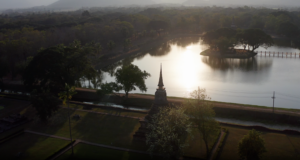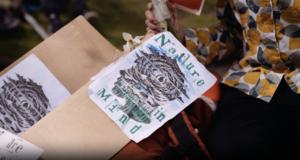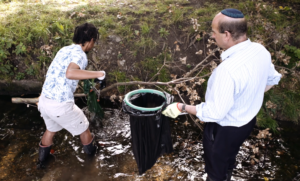Climate change is a global pressing issue. It affects everyone, irrespective of their religious beliefs. In this film, viewpoints on the climate crisis are explored and we hear about how different faith communities are coming together and focusing on what binds them together to help combat some of the problems the world is facing. The film features representatives from Faith for the Climate, Islamic Relief and Christian Aid.
Transcript
Climate Change: Multi-Faith Views
Shanon: Today we have set up an interfaith stall in lower marsh in London in front of the offices of Islamic Relief UK and Christian Aid, who are both members of Faith for the Climate. They are part of the network with the support of our other members as well, from Buddhist, Hindu and Sikh and other Christian backgrounds and Muslim backgrounds. And we're trying to get people to understand that rich governments and big polluters in the world need to do more to support the communities in the worlds that are suffering from the worst impacts of climate change, especially since they've done the least to cause it. So this campaign is called Make Polluters Pay, and it's about paying up for the loss and damage that's suffered in these other communities in the world. And so often in the news headlines, we see how faith can become a divisive force in the world. But what we know is a network that's doing work on the climate emergency is that there are people of every single faith who want to come together for purposes like this to save the planet for environmental justice. And they come based on different teachings in their faith traditions. So the Buddhists in our network talk about their belief in the interconnectedness of all life. The Hindu based traditions talk about non-violence. The Muslims will talk about the need to respect balance or misran in creation or the trusteeship of God's creation. The Christians will talk about good stewardship. The Jews will talk about tikkun olam or the need to repair the world. And lots of pagans in our network will basically worship nature. When everyone comes together and shares these different teachings, they realize that even though we come from quite different backgrounds, we do have a common purpose. I actually used to work with an oil and gas company in Malaysia, and this is how I saw firsthand how the fossil fuel industry causes environmental damage and then tries to wash its hands off it. There is a concept in Islam that's really important for me personally, which is torba repentance, and there's always hope if you repent. So actually doing climate justice and human rights work, for me, it's now a kind of repentance from having been part of the fossil fuel industry. There is a tradition about the Prophet Muhammad, peace be upon him in Islam, and it's when a companion of his comes to him a little bit distress and asks him, Please help me to think about sin and righteousness. I want to know the difference. And the prophet jabs him in the heart three times and says, Ask yourself, ask your heart three times. The prophet says that he explains, Sin is that which disturbs your heart. Even though other people say something might be lawful and righteousness is you acting on that, even though other people tell you you don't need to act on it. And this is known as the fatwa or the ruling of the heart. And that is something I hold very close to me. If my heart tells me something is wrong, I know that the prophet says I should listen to it. How could you possibly love God if you don't love your fellow human beings? It's as simple as that. And what does love mean? Love means helping people when they need your help. In the Abrahamic faiths, it's about caring for the stranger, the visitor, the poor person, the orphan, the person in need. That's love. How can you love God if you don't do that? And if we think about what the climate crisis does, it actually makes people lose their homes, lose their jobs, lose their families, lose their health. If you think about how they have to deal with extreme heat and drought and floods and the illness that comes with that, if they're facing that, how could we possibly love God if we don't love them and help them? So one quote that I've come across in my line of work really inspires me. It's from Rabbi Abraham Joshua Heschel, who was an American rabbi who actually supported the civil rights movement there. He marched alongside Reverend Martin Luther King Jr. So this was in itself is a beautiful example of interfaith friendship. But what Rabbi Heschel said and he was talking in the context of racism and the Holocaust was few are guilty, but all are responsible. And I think that is the way we need to think of what we can do in the climate crisis as well. We all have a role to play. If you know that you are in a position where you have more power and privilege, how can you use more of that power and more of that privilege for climate justice, especially to help people who have less power and less privilege and are suffering more from the climate crisis than you are? So this is why whatever we do, whatever choices we make, won't just affect people on the other side of the world. In the global South, we will be affected to all of us together. If not today, then at some point in the very near future. And this is why it's important for all of us to take action together.
Alaa: As a muslim or those who follow the Muslim faith. We strongly believe in environmentalism. We believe that it's rooted in our tradition. It's rooted in scripture. We looked at the Prophet Muhammad, peace be upon him as a guiding source for for us in terms of emulating his characters and his attitude to things. And he really valued the environment. And so it's very important for us as Muslims to act on that. We believe that God places on his earth as stewards to look after his green planet. And so that is what inspires me in this role. As I work for Islamic Relief, it inspires me as a muslim and as a worker to do more in this space, because I believe that is something that it serves my religion but also the greater good for the planet.
Lydia: So I think it's important as a Christian to look after the planet because God gave it to us as part of a creation and gave us a role to be a steward over this. It's part about also about showing love to each other and to all elements of nature. And that's part of our faith. We are called Jesus showed us that example to show love to everyone, every neighbor, every individual, everything in the world, every living creature. I think it's everyone's responsibility to look after the planet. And we each can do it in our own individual lives and our own actions. But also it's really important to recognize that governments and companies which have larger power have a larger responsibility. They're global and international. They're big organizations with lots of power, and they can change the structures of our whole world.
Alaa: I think working with other faiths is a fantastic way of bringing people together in a neutral space. For many people, we come from all walks of life. We may believe different things. We might we may feel, you know, follow different deities. But actually, at the heart of it, we believe in some very fundamental principles. It's wonderful to be here today on the sunny, really bright day, working with colleagues across faiths to come together around a combined message. It's great to feel that we're doing something to combat the climate crisis in our own way, as well as just come together around positive action.
Shanon: And I wake up in the morning and I come across news about some climate disaster in the world or another, you know, the damage that private jets are causing or the Arctic sea ice melting or wildfires somewhere and people dying. I get really hopeless and terrified and helpless. But when I come out and do things like this and I realize that there are people around me, even people of different faith traditions, but we connect so well because we are so passionate about this issue. I feel inspired and I feel energized. I feel like it's going to be a challenge, but we can do this if we do this together. If you are anxious about climate change, talk about it. There is actually value in making your feelings known and talking to people who feel the same way that you do and finding support with them. And then you realize that it doesn't stop there. You can do things together. You can talk about this with more people and then you can start talking to anyone your local MP, local councillors, local faith leaders, schools, businesses. There are so many charities like Friends of the Earth or Christian Aid or Cafod that have local chapters as well that you could get involved in. And then we realise that when we get together we can do things from very small local actions to the really big stuff that's about changing the system at large and we can do it together.










